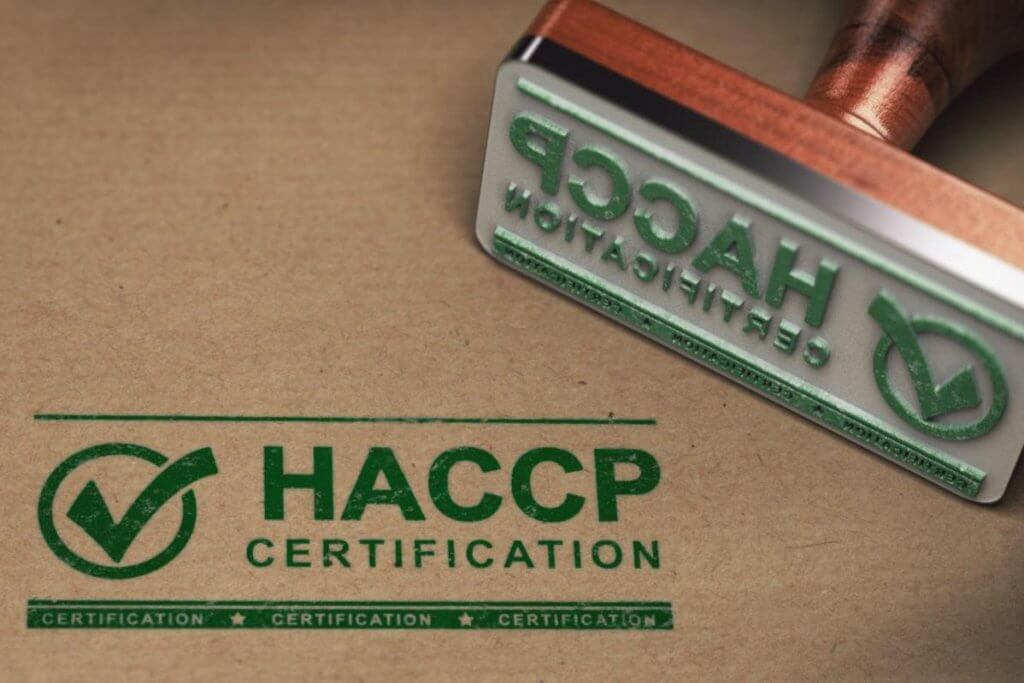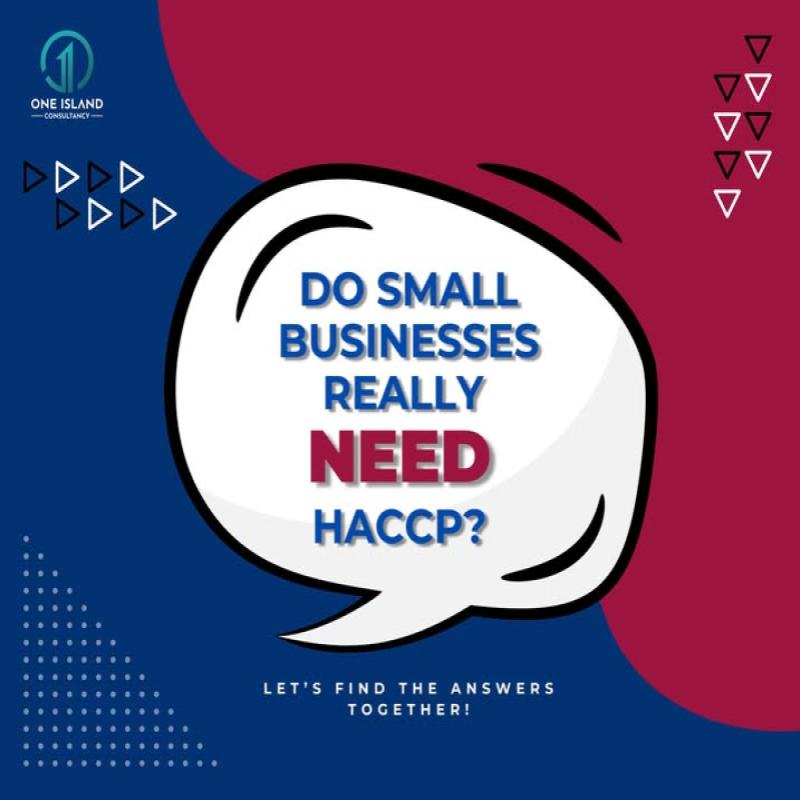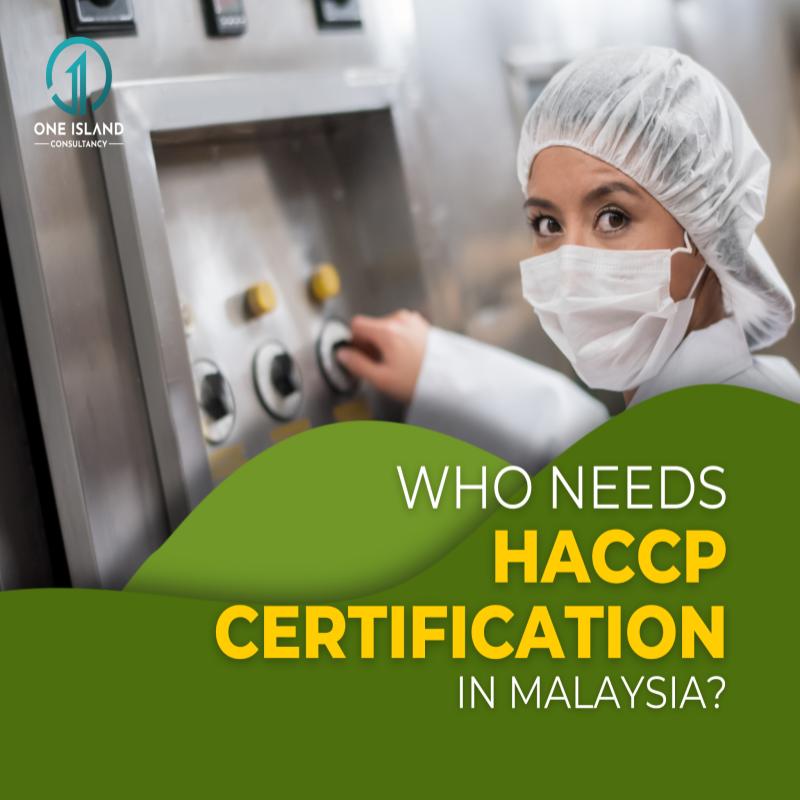
What is GMP Certification in Malaysia?
June 3, 2025
What is ESG Framework: How to Get ESG Certification in Malaysia
July 18, 2025Do you want to keep your food business safe and trusted by your customers?
HACCP Certification Malaysia is the key to running a safe and successful food business!
With HACCP, you can quickly identify risks, control hazards, and improve your operations, giving your business the safety and credibility it needs to thrive.
This guide will explain why HACCP is important for Malaysian food businesses, how to get certified, and how it can help your business grow.
Key Takeaway
- HACCP (Hazard Analysis and Critical Control Points) is a preventive food safety system that identifies and controls hazards in food production.
- HACCP certification ensures food safety, regulatory compliance, brand credibility, and access to international markets.
- Food manufacturers, restaurants, catering services, packaging companies, and any business handling food should obtain HACCP certification.
- Verify HACCP certification on MOH Malaysia’s FSQD website or certification bodies like SIRIM and SGS Malaysia.
- Businesses must implement HACCP principles, prepare documentation, undergo an audit, and apply through a recognised certification body.
- HACCP certification costs depend on business size, audit complexity, and documentation requirements.
What is HACCP Certification?

HACCP (Hazard Analysis Critical Control Point) is a globally recognized system for getting food safety certification that helps ensure your food products are safe for customers.
It identifies and controls risks, such as bacteria, chemicals, and other hazards, at every stage—from handling raw ingredients to delivering the final product.
Using HACCP shows regulators, customers, and the public that your food safety practices are reliable and well-managed, helping to build trust in your business.
8 Benefits of HACCP Certification

Getting HACCP certification is important for small businesses in Malaysia. It shows your commitment to food safety and assures customers and partners that your business is reliable.
- Builds Customer Trust: Consistent product quality leads to happier and more loyal customers.
- Ensures HACCP Food Safety Control: Implements effective systems to ensure safe food production.
- Meets Regulations: Complies with both local and international food safety standards.
- Aligns with ISO 22000: Integrate HACCP with ISO 22000 Malaysia for comprehensive safety measures.
- Provides Legal Protection: Reduces the risk of fines, penalties, and legal issues related to food safety violations.
- Improves Operations: Streamlines processes, reduces risks, and ensures smooth operations with clear safety guidelines.
- Reduces Costs: Minimises waste, product recalls, and rework by maintaining high-quality standards.
- Enhances Supply Chain Value: Strengthens your supply chain by ensuring consistent hazard controls and robust food safety practices.
- Competitive Advantage: Sets your business apart in a crowded market by showcasing your commitment to food safety.
HACCP certification helps you build trust, stay compliant, and run a safer, more efficient food business.
Who Needs HACCP Certification in Malaysia?

Although HACCP certification is not legally required for all businesses, it is highly valuable for showing your commitment to food safety. Here’s a simple guide to which industries benefit the most:
| Type of Business | Why is HACCP Certification Important |
| Food Manufacturers | Ensure food safety during large-scale production and build trust with customers and partners. |
| Food Processors | Control risks during food processing to prevent contamination and ensure product quality. |
| Packages | Ensure packaged food is safe and meets quality standards before reaching consumers. |
| Food Distributors | Help maintain food safety during transportation and storage, reducing risks of spoilage or contamination. |
| Food Service Providers | Ensure safe food handling and preparation in restaurants, catering, and food delivery services. |
Both new and established food businesses benefit from:
- Increased Customer Confidence: Shows your dedication to safety and quality
- Streamlined Operations: Improves processes and reduces risks
- Higher Profitability: Avoids costly recalls and builds a trustworthy brand
Investing in HACCP certification helps your food business succeed and stay ahead of the competition.
Find out more details about HACCP certification in Malaysia.
How to Check HACCP Certification in Malaysia
Ensuring that a business holds a valid HACCP certification is crucial for maintaining food safety compliance with Malaysian law, safeguarding against fraudulent certifications that may lead to legal issues, and building trust with customers, suppliers, and international trade partners.
Here’s a step-by-step guide on how to check HACCP certification in Malaysia:
| Steps | Details |
| Step 1: Visit the Official Regulatory Websites | Check HACCP certification through Food Safety and Quality Division (FSQD), Ministry of Health Malaysia or Department of Standards Malaysia (DSM). |
| Step 2: Search for the HACCP Certificate Number or Business Name | 1) If you have the certificate number, enter it into the official database. 2) If you don’t, search using the business name to verify its certification status. |
| Step 3: Verify the Certification Body | Confirm that the certificate was issued by a MOH-recognized certification body, such as: 1) SIRIM QAS International 2) SGS Malaysia 3) Bureau Veritas Malaysia 4) Intertek Malaysia 5) Lloyd’s Register Malaysia |
| Step 4: Check Certification Validity and Expiry Date | 1) HACCP certificates are valid for 3 years with annual surveillance audits. 2) Ensure the certificate is still active and compliant with current standards. |
| Step 5: Identify Signs of a Fraudulent Certification | Look out for red flags such as: 1) No record found on FSQD or certification body websites. 2) Missing certification number or incorrect details. 3) Fake seals or unauthorized certification bodies. 4) No official audit report accompanying the certificate. |
| Step 6: Contact Certification Consultant for Assistance | 1) Certification consultants like One Island help businesses verify HACCP certification legitimacy. 2) Assistance with renewals, compliance updates, and transitioning to HACCP MS 1480:2019. 3) Consulting on missing documentation or audit preparation. |
How to Get HACCP Certification?

The HACCP certification process in Malaysia involves several key steps, from understanding regulatory requirements to final certification audits.
Here’s a step-by-step breakdown of how businesses can achieve HACCP certification.
| Steps | Details | Required Documents |
| Step 1: Understanding HACCP Requirements | 1) Learn about HACCP MS 1480:2019 standards and Ministry of Health Malaysia (MOH) regulations. 2) Ensure compliance with Good Manufacturing Practices (GMP) and food hygiene laws. 3) Identify the scope of HACCP certification based on business operations (e.g., food processing, packaging, or handling). Tip: Study HACCP case studies and industry-specific regulations to understand key requirements for your sector. | Not required |
| Step 2: Implementing the HACCP System | Apply the 7 HACCP Principles: 1) Hazard Analysis – Identify biological, chemical, and physical hazards. 2) Critical Control Points (CCPs) – Determine points in production where hazards can be controlled. 3) Establish Critical Limits – Define safety limits (e.g., temperature, pH levels). 4) Monitor CCPs – Implement tracking procedures for compliance. 5) Establish Corrective Actions – Plan responses to deviations. 6) Verify HACCP System – Conduct audits and testing. 7) Maintain Documentation & Records – Keep food safety logs for regulatory compliance. Tip: Create a flowchart of your production process to clearly visualise hazards and control points. | 1) HACCP Plan – Hazard Analysis, Critical Limits, Corrective Actions. 2) Process Flowchart – Visual representation of food production stages. 3) SOPs (Standard Operating Procedures) for food handling and hygiene. 4) Food Safety Records– Monitoring logs, temperature records, and cleaning schedules. |
| Step 3: Preparing for the HACCP Audit | 1) Conduct internal audits to check compliance with HACCP guidelines. 2) Review HACCP documentation, SOPs (Standard Operating Procedures), and food safety records. 3) Train employees on food handling procedures and corrective actions. 4) Address non-compliance issues before the official audit. | 1) Internal Audit Reports– Records of pre-certification audits. 2) Employee Training Records – Proof of HACCP and food safety training. 3) Corrective Action Reports – Addressing previous non-compliance issues. |
| Step 4: Check Certification Validity and Expiry Date | 1) Choose an MOH-recognized HACCP certification body. 2) Submit the HACCP application along with the required documents. 3) Undergo a Stage 1 Audit (document review) and Stage 2 Audit (on-site facility inspection). 4) Address any audit findings before final certification approval. Tip: Ensure your HACCP plan is customized for your business operations—generic templates may not meet certification standards. | 1) HACCP Plan (Fully Developed & Implemented) 2) Process Flowchart & Risk Assessment Report 3) GMP Compliance Report 4) Food Safety Policy Statement 5) List of Critical Control Points (CCPs) & Monitoring Records 6) Product Description & Ingredients List 7) Supplier & Raw Material Verification Records 8) Sanitation & Hygiene Procedures (SOPs) 9) Employee Training Records (HACCP & Food Safety) 10) Internal Audit Reports & Corrective Action Records 11) Application Form & Fee Payment Receipt |
| Step 5: Identify Signs of a Fraudulent Certification | 1) Maintain HACCP records and conduct regular internal food safety audits. 2) Update SOPs and hazard control measures as per regulatory changes. 3) Undergo annual surveillance audits to retain HACCP certification validity. 4) Renew HACCP certification every 3 years before expiry. Tip: Set up automatic reminders for HACCP renewal and audits to prevent last-minute compliance issues. | 1) Annual Surveillance Audit Reports 2) Updated HACCP Plan (if necessary) 3) Renewal Application Form & Fee Payment Receipt |
HACCP Certification Cost in Malaysia
The cost of HACCP food safety certification can vary based on these factors:
| Factor | Explanation |
| Business Size | Larger businesses may pay more due to complex processes and longer audit times. |
| Extent of Corrective Actions | More issues during the audit mean more fixes and higher costs. |
| HACCP Plan Readiness | A complete, well-prepared plan lowers costs by reducing the need for adjustments. |
| Chosen Certification Level | Basic certifications are cheaper; advanced levels cost more. |
| Auditor Contracts and HACCP Training Malaysia Requirements | Costs depend on the auditor’s fees, contract terms, and staff training needs. |
Understanding these factors helps you budget effectively and avoid unexpected expenses when pursuing HACCP certification for your food business in Malaysia.
How One Island Consultancy Can Help You
One Island Consultancy simplifies the process for businesses by providing end-to-end consultation and support to help you achieve HACCP certification in Malaysia.
With a team of food safety experts and regulatory specialists, we ensure businesses meet HACCP MS 1480:2019 standards while streamlining the certification process.
| Key Services | Details |
| Initial Consultation & Gap Analysis | 1) Conducts a comprehensive food safety assessment to determine HACCP readiness. 2) Identifies gaps in food handling, hygiene practices, and documentation. 3) Provides a detailed gap analysis report with recommendations for compliance. |
| HACCP Documentation & Plan Development | 1) Assists in creating a customized HACCP plan tailored to business operations. 2) Prepares required documentation, including: -Hazard Analysis & Critical Control Points (CCPs) Report -Process Flowchart & Risk Assessment -Standard Operating Procedures (SOPs) for Hygiene & Sanitation -Supplier & Raw Material Verification Documents |
| HACCP Implementation & Employee Training | 1) Provides on-site HACCP certification course training workshops for employees. 2) Ensures all staff understand critical control points, monitoring procedures, and corrective actions. 3) Implements food safety management systems (FSMS) and internal control procedures. |
| Internal Audit & Pre-Assessment Review | 1) Conducts mock audits and internal pre-assessments to detect non-compliance issues. 2) Prepares businesses for official certification audits by reviewing: -Food safety records and logs -Audit checklists and compliance reports 3) Employee readiness for HACCP inspections |
| Application Submission & Certification Audit Support | 1) Assists in preparing and submitting the HACCP certification application. 2) Liaises with MOH-approved certification bodies 3) Provides on-site support during Stage 1 & Stage 2 HACCP audits, ensuring smooth certification approval. |
| Post-Certification Support & Renewal | 1) Helps businesses maintain HACCP compliance through annual surveillance audits. 2) Provides continuous updates on food safety regulations and HACCP standard changes. 3) Assists with HACCP certification renewal and documentation updates before expiry. |
Why Choose Us?
- Expert Guidance from Start to Finish: Our experienced auditors and food safety consultants handle the entire process, from initial assessment to final certification.
- Comprehensive Documentation Support – Ensures all HACCP paperwork and records are accurate and compliant.
- Industry-Specific Solutions – Customised HACCP plans for food manufacturers, restaurants, catering services, and packaging businesses.
- Audit-Ready Preparation – Conducts internal audits and pre-certification assessments to maximise approval success.
- Regulatory Compliance: Ensure you meet Malaysian and international food safety standards
- Long-Term Compliance Support: Provides continuous monitoring, annual audits, and renewal assistance for ISO 9001 Malaysia, HACCP, ISO 22000 Malaysia, and GMP certification Malaysia
ABC Food Corporation Achieved HACCP Certification with Expert Guidance
ABC Food Corporation, a mid-sized Malaysian manufacturer of ready-to-eat meals and frozen food, set out to improve food safety and expand into international markets. To meet global standards and comply with Malaysia’s stringent food safety regulations, the company aimed to achieve HACCP (Hazard Analysis and Critical Control Point) certification.
Despite its growth and success, ABC faced multiple challenges in implementing a structured food safety system across its operations—ranging from inconsistent production practices to a lack of internal expertise on HACCP requirements.
Challenges
- Inconsistent Food Safety Practices: Lack of standardised procedures led to variation in quality and potential contamination risks.
- Regulatory Compliance: The company struggled to meet complex HACCP criteria required for both local and international food export regulations.
- Staff Awareness & Training: Many employees were unfamiliar with HACCP principles and the role of Critical Control Points (CCPs).
- Documentation Gaps: Ineffective record-keeping made traceability and monitoring difficult.
One Island’s Solution
- HACCP Plan Development
a) One Island worked closely with ABC’s team to conduct a hazard analysis and identify CCPs throughout the production process.
b) A customized HACCP plan was implemented with clearly defined control measures and corrective actions. - Standardization of Operations
Production processes were reviewed and aligned with HACCP best practices, ensuring uniform safety protocols across all departments. - Staff Training & Awareness
One Island conducted targeted training sessions for employees on CCP monitoring, hygiene, and food handling based on HACCP standards. - Documentation System Upgrade
A new system was introduced for recording CCP checks, cleaning schedules, and corrective actions, supporting audit readiness and compliance. - Internal Audits & Compliance Monitoring
Regular mock audits helped ABC identify and correct issues early, improving readiness for the final HACCP certification audit.
Results & Business Impact
- Successfully Achieved HACCP Certification: ABC passed the third-party audit and received HACCP certification, validating its food safety system.
- Improved Product Quality & Safety: Implementation of the HACCP plan led to a significant reduction in contamination risks and product defects.
- Increased Market Access & Consumer Trust: Certification enhanced ABC’s reputation, enabling them to expand into international markets and secure new clients.
- Operational Efficiency: The standardized procedures and improved documentation helped reduce waste and improve production flow.
Conclusion
Getting HACCP certified shows your commitment to food safety and helps your business grow. It builds customer trust, improves operations, and ensures you meet safety standards.
Ready to get HACCP certified? Contact One Island Consultancy for expert guidance and support. We’re here to help your food business achieve the highest safety standards!





